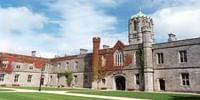They also design and administer appropriate methods of assessment, and create exercise or training programmes aimed at improving either health or sporting performance.
As a sport scientist, you must be well versed in technical, physiological and psychological aspects of your field in order to cover territory as diverse as exercise testing, psychological preparation for competition, movement analysis, dietary considerations and strength training.
Early on in DCU?s Sport Science and Health course, you?ll examine the key science subjects that form the backbone of this degree: chemistry, physics, anatomy, physiology, psychology and sociology. As you progress, you?ll learn how these subjects are applied to the study of sport, exercise and health, and what role factors like nutrition and genetics play, as well.













